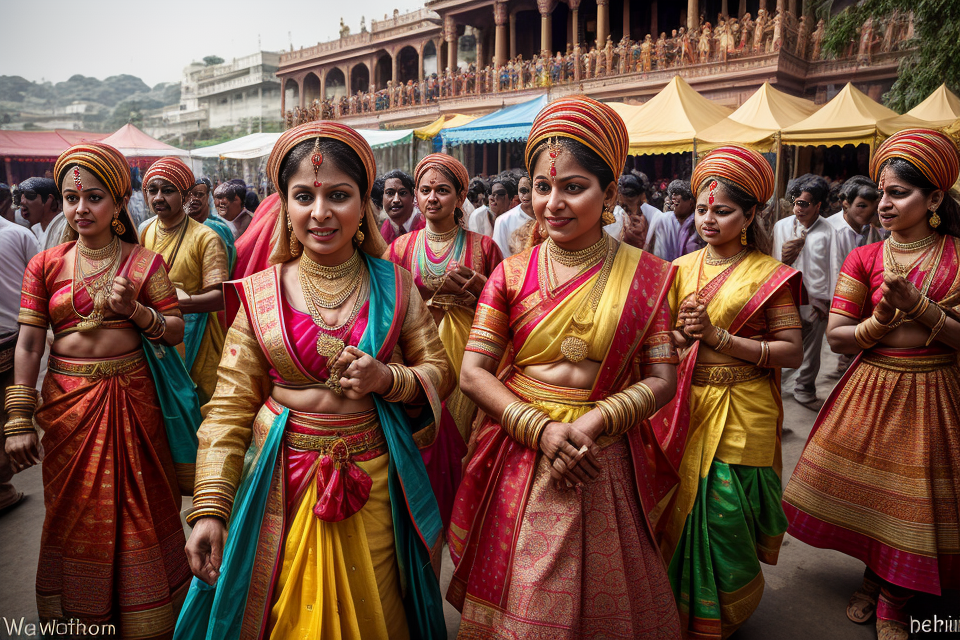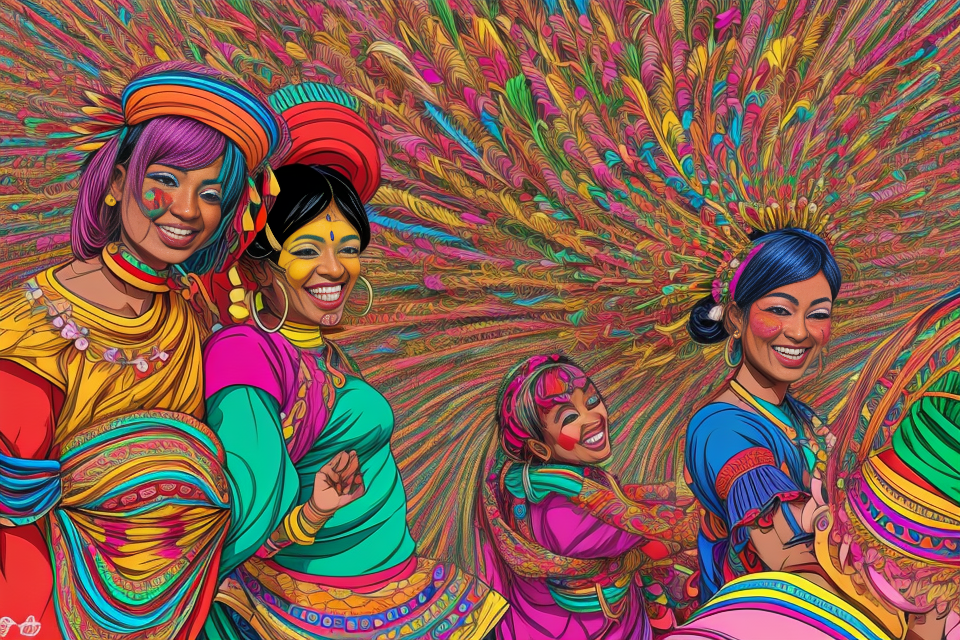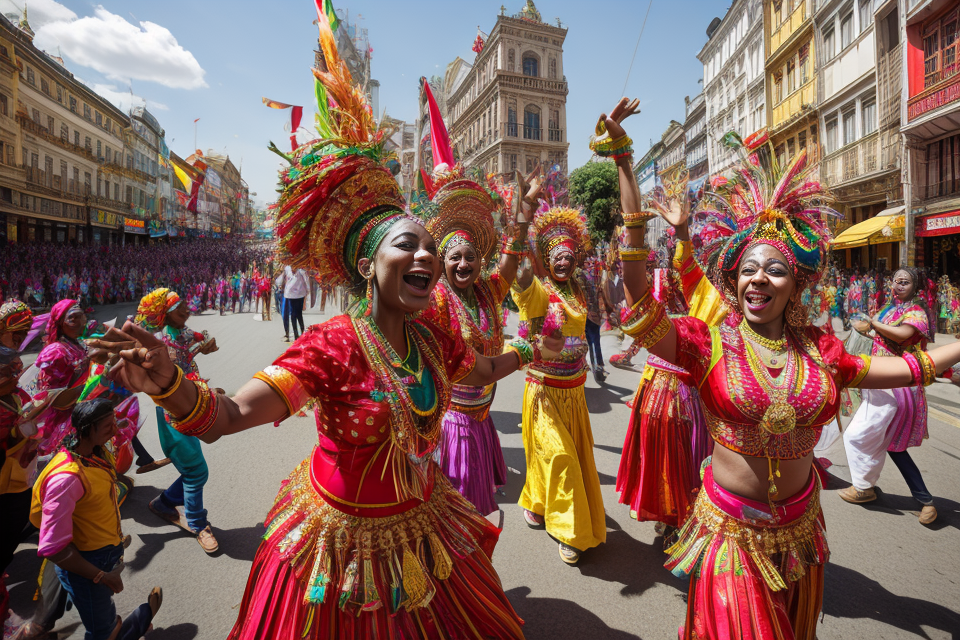Festivals have been an integral part of human society since time immemorial. They are occasions that bring people together to celebrate, have fun, and mark important events or milestones in their lives. But beyond just being occasions for merriment, festivals also hold immense cultural significance. They reflect the customs, traditions, and beliefs of a particular society or community, and serve as a means of preserving and passing down cultural heritage from one generation to another. In this article, we will explore the cultural significance of festivals and how they contribute to the rich tapestry of human culture.
The Definition of a Festival
What is a festival?
A festival is a gathering of people who come together to celebrate a particular event or tradition. This event can be religious, cultural, or secular in nature, and it often involves music, food, dancing, and other forms of entertainment.
Festivals serve as a way for people to come together and share in a common experience, whether it be a religious holiday, a cultural celebration, or a secular event. They provide an opportunity for people to connect with one another, to share in their cultural heritage, and to celebrate the things that bring them together.
Festivals can take many forms, from small community events to large-scale celebrations that draw people from all over the world. They can be formal or informal, and they can last for just a few hours or for several days. No matter what the specifics of the festival may be, they all share a common goal: to bring people together to celebrate and have fun.
Types of festivals
Festivals are celebrations that are often marked by a specific date or time, and they are typically characterized by a variety of cultural practices and traditions. Festivals can be broadly categorized into three main types: religious festivals, cultural festivals, and secular festivals.
Religious festivals
Religious festivals are celebrations that are primarily centered around religious beliefs and practices. These festivals often have deep historical and cultural roots, and they are typically observed by adherents of a particular faith. Some examples of religious festivals include Christmas, Easter, and Ramadan.
Christmas
Christmas is a religious festival that is celebrated by Christians around the world. It commemorates the birth of Jesus Christ, and it is typically observed on December 25th. The festival is marked by a variety of cultural practices, including the exchange of gifts, the decoration of trees, and the singing of carols.
Easter
Easter is a religious festival that is celebrated by Christians around the world. It commemorates the resurrection of Jesus Christ, and it is typically observed on the first Sunday after the first full moon after the vernal equinox. The festival is marked by a variety of cultural practices, including the exchange of eggs, the decoration of eggs, and the consumption of special foods.
Ramadan
Ramadan is a religious festival that is celebrated by Muslims around the world. It is a month-long period of fasting and prayer, and it is typically observed during the ninth month of the Islamic calendar. The festival is marked by a variety of cultural practices, including the consumption of special foods, the recitation of prayers, and the observance of special rituals.
Cultural festivals
Cultural festivals are celebrations that are primarily centered around cultural practices and traditions. These festivals often have deep historical and cultural roots, and they are typically observed by members of a particular cultural group. Some examples of cultural festivals include Chinese New Year, Diwali, and Mardi Gras.
Chinese New Year
Chinese New Year is a cultural festival that is celebrated by Chinese people around the world. It marks the beginning of the lunar new year, and it is typically observed in late January or early February. The festival is marked by a variety of cultural practices, including the exchange of red envelopes, the lighting of firecrackers, and the consumption of special foods.
Diwali
Diwali is a cultural festival that is celebrated by Hindus, Sikhs, and Jains around the world. It is a festival of lights, and it is typically observed in October or November. The festival is marked by a variety of cultural practices, including the lighting of lamps, the exchange of gifts, and the consumption of special foods.
Mardi Gras
Mardi Gras is a cultural festival that is celebrated in many parts of the world, but it is particularly associated with the city of New Orleans in the United States. It is a festival of excess that is typically observed in the days leading up to the Christian season of Lent. The festival is marked by a variety of cultural practices, including the wearing of masks, the exchange of gifts, and the consumption of special foods.
Secular festivals
Secular festivals are celebrations that are not primarily centered around religious or cultural practices and traditions. These festivals are often observed by a wider community, and they are typically marked by a variety of cultural practices and traditions. Some examples of secular festivals include Halloween, Thanksgiving, and Independence Day.
Halloween
Halloween is a secular festival that is celebrated in many parts of the world, but it is particularly associated with the United States. It is a festival of costumes and candy, and it is typically observed on October 31st. The festival is marked by a variety of cultural practices, including the wearing of costumes, the
The Cultural Significance of Festivals
The role of festivals in preserving cultural traditions
Festivals play a crucial role in preserving cultural traditions by providing a platform for cultural expression and identity, passing down cultural values and beliefs to future generations, and encouraging community engagement and social cohesion.
- Provide a platform for cultural expression and identity
- Festivals serve as a venue for individuals to express their cultural identity and showcase their traditions. They offer an opportunity for people to demonstrate their cultural heritage through music, dance, food, and other cultural practices.
- Through festivals, individuals can celebrate and preserve their cultural traditions, which may have been passed down through generations. Festivals allow people to maintain a connection with their cultural roots and to keep their traditions alive.
- Pass down cultural values and beliefs to future generations
- Festivals are an effective way to transmit cultural values and beliefs to future generations. By participating in festivals, individuals can learn about their cultural heritage and the significance of their traditions.
- Through festivals, young people can learn about their cultural identity and develop a sense of pride in their heritage. Festivals also provide an opportunity for elders to pass down their knowledge and experiences to younger generations, ensuring that cultural traditions are preserved and passed down.
- Encourage community engagement and social cohesion
- Festivals promote community engagement and social cohesion by bringing people together and fostering a sense of belonging. They provide an opportunity for people to connect with others who share similar cultural traditions and to build relationships with individuals from different backgrounds.
- Festivals can help to bridge cultural divides and promote understanding and respect between different communities. By participating in festivals, individuals can learn about different cultures and develop a greater appreciation for cultural diversity.
Overall, festivals play a critical role in preserving cultural traditions by providing a platform for cultural expression and identity, passing down cultural values and beliefs to future generations, and encouraging community engagement and social cohesion.
The economic impact of festivals
Festivals have a significant impact on the economy of a region. They generate revenue for local businesses and economies, create jobs and employment opportunities, and attract tourists and increase tourism revenue.
Generate revenue for local businesses and economies
Festivals provide a boost to the local economy by generating revenue for local businesses. This revenue is generated through the sale of food, drinks, merchandise, and other items that are sold during the festival. Additionally, festival attendees often stay in local hotels, rentals, and vacation homes, which further boosts the local economy.
Create jobs and employment opportunities
Festivals also create jobs and employment opportunities for the local community. They require a large number of workers to set up and run the event, including vendors, security personnel, cleaning crews, and more. Additionally, the increased tourism that festivals bring can lead to new job opportunities in the hospitality and tourism industries.
Attract tourists and increase tourism revenue
Festivals also attract tourists from outside the local area, which can increase tourism revenue. This can have a positive impact on the local economy, as tourists often spend money on accommodations, dining, shopping, and other activities while they are in the area. Furthermore, the increased exposure that a region receives from hosting a festival can help to boost its reputation as a desirable destination for tourists.
The environmental impact of festivals
Festivals, as cultural events, can have both positive and negative environmental impacts. It is important to consider these impacts in order to understand the role that festivals play in our society and how they can be improved to have a more positive effect on the environment.
One negative environmental impact of festivals is waste production. With large numbers of people attending festivals, there is often a significant amount of waste generated in the form of food packaging, plastic cups, and other disposable items. This waste can contribute to landfills and pollution if not properly managed.
Another negative environmental impact of festivals is energy consumption. Festivals often require a significant amount of energy to power stages, lighting, and other equipment. This energy consumption can contribute to greenhouse gas emissions and climate change.
However, festivals can also have positive environmental impacts. For example, some festivals promote sustainability by using renewable energy sources, reducing waste, and promoting environmental awareness. These efforts can help to mitigate the negative environmental impacts of festivals and promote a more sustainable future.
Additionally, festivals can provide opportunities for education and awareness about environmental issues. By highlighting the importance of sustainability and the impact of human actions on the environment, festivals can play a role in promoting a more sustainable society.
In conclusion, the environmental impact of festivals is complex and multifaceted. While they can have negative impacts on the environment, they also have the potential to promote sustainability and raise awareness about environmental issues. Understanding these impacts is an important step in developing festivals that are more environmentally friendly and sustainable.
The Importance of Festivals in the Modern World
The role of festivals in promoting cultural diversity and understanding
- Bring together people from different backgrounds and cultures
- Provide a platform for individuals to share their customs, traditions, and beliefs with others
- Encourage cross-cultural exchange and understanding
- Foster mutual respect and understanding
- Facilitate dialogue and cooperation between different cultural groups
- Promote empathy and tolerance
- Promote global citizenship and intercultural dialogue
- Encourage individuals to see themselves as part of a global community
- Foster understanding and cooperation among different cultures
In today’s world, cultural diversity is more important than ever before. With the increasing globalization and the ease of travel and communication, it is crucial to understand and appreciate different cultures. Festivals play a significant role in promoting cultural diversity and understanding. By bringing together people from different backgrounds and cultures, festivals provide a platform for individuals to share their customs, traditions, and beliefs with others. This encourages cross-cultural exchange and understanding, fostering mutual respect and tolerance among different cultural groups.
Furthermore, festivals promote global citizenship and intercultural dialogue. They encourage individuals to see themselves as part of a global community and to appreciate the diversity of cultures around the world. Festivals also facilitate dialogue and cooperation between different cultural groups, fostering understanding and cooperation among different cultures.
Overall, festivals play a vital role in promoting cultural diversity and understanding in the modern world. They provide a platform for individuals to share their cultures, foster mutual respect and understanding, and promote global citizenship and intercultural dialogue.
The role of festivals in promoting social cohesion and community building
Festivals play a crucial role in promoting social cohesion and community building. They provide opportunities for people to come together and socialize, foster a sense of belonging and community identity, and encourage civic engagement and volunteerism.
- Social cohesion: Festivals create a platform for people from diverse backgrounds to come together and interact. They provide an opportunity for people to connect with each other, share their cultures, and learn from one another. This interaction helps to build social cohesion and promote understanding among different groups of people.
- Community identity: Festivals help to create a sense of community identity. They provide a shared experience that people can identify with, which helps to build a sense of belonging and identity. This sense of identity can be a source of pride and unity for the community.
- Civic engagement and volunteerism: Festivals also encourage civic engagement and volunteerism. They provide an opportunity for people to get involved in their community and contribute to its well-being. Many festivals rely on volunteers to organize and run the event, which provides an opportunity for people to give back to their community. Additionally, festivals often raise funds for local charities and causes, encouraging people to support their community through their participation and donations.
Overall, festivals play a vital role in promoting social cohesion and community building. They provide opportunities for people to connect, interact, and build a sense of community identity, while also encouraging civic engagement and volunteerism.
The role of festivals in promoting creativity and innovation
Festivals play a crucial role in promoting creativity and innovation in the modern world. They provide a platform for artists and performers to showcase their work, encourage experimentation and innovation in the arts and culture, and foster a creative and innovative mindset in individuals and communities.
Provide a platform for artists and performers to showcase their work
Festivals offer a unique opportunity for artists and performers to showcase their work to a wider audience. This exposure can lead to increased recognition and opportunities for collaboration, which can have a significant impact on their careers. Additionally, the diverse range of performances and exhibitions at festivals provides audiences with a chance to experience a wide range of artistic expressions, promoting cultural exchange and appreciation.
Encourage experimentation and innovation in the arts and culture
Festivals are often characterized by their focus on innovation and experimentation. They provide a space for artists and performers to push boundaries and explore new forms of expression. This encouragement of experimentation and innovation can lead to the development of new artistic movements and styles, which can have a profound impact on the cultural landscape.
Moreover, festivals often feature workshops, masterclasses, and other educational programs that provide opportunities for artists and audiences to learn about new techniques, technologies, and approaches to creating art. These opportunities for learning and collaboration can foster a culture of innovation and experimentation that extends beyond the festival itself.
Foster a creative and innovative mindset in individuals and communities
Festivals can also foster a creative and innovative mindset in individuals and communities. By exposing people to a wide range of artistic expressions, festivals can inspire new ideas and ways of thinking. This can lead to a greater appreciation for the arts and culture, as well as a desire to create and innovate in one’s own field.
Furthermore, the sense of community and shared experience that is often present at festivals can encourage collaboration and co-creation. By bringing together people from diverse backgrounds and perspectives, festivals can facilitate the exchange of ideas and the development of new approaches to problem-solving.
In conclusion, festivals play a vital role in promoting creativity and innovation in the modern world. By providing a platform for artists and performers to showcase their work, encouraging experimentation and innovation, and fostering a creative and innovative mindset in individuals and communities, festivals contribute to the ongoing evolution of the arts and culture.
FAQs
1. What is a festival?
A festival is a special event or occasion that is typically celebrated by a group of people with shared cultural, religious, or social traditions. Festivals often involve music, food, dancing, and other activities that bring people together to celebrate and honor their shared beliefs and values.
2. Are festivals always cultural events?
Festivals can be cultural events, but they can also be celebrations of other types of events or occasions, such as religious holidays, national holidays, or sports events. In general, festivals are any special events that bring people together to celebrate and mark a particular occasion or time of year.
3. What is the cultural significance of festivals?
Festivals are important cultural events because they help to preserve and pass on the traditions, beliefs, and values of a particular group of people. They also provide a way for people to come together and connect with one another, regardless of their background or beliefs. In many cases, festivals are an important part of a community’s identity and can help to bring people together and strengthen social bonds.
4. How do festivals promote cultural understanding?
Festivals can promote cultural understanding by providing an opportunity for people to learn about and experience different cultures firsthand. By attending a festival, people can learn about the customs, traditions, and beliefs of other cultures, and they can also see how these cultures are celebrated and honored. This can help to break down barriers and promote greater understanding and appreciation of different cultures.
5. Are festivals always inclusive?
Festivals can be inclusive or exclusive, depending on the specific event and the group of people celebrating it. Some festivals are open to everyone and are designed to be inclusive, while others may be more exclusive and may only be celebrated by a specific group of people. It is important to consider the context and the specific festival in question when thinking about inclusivity.



